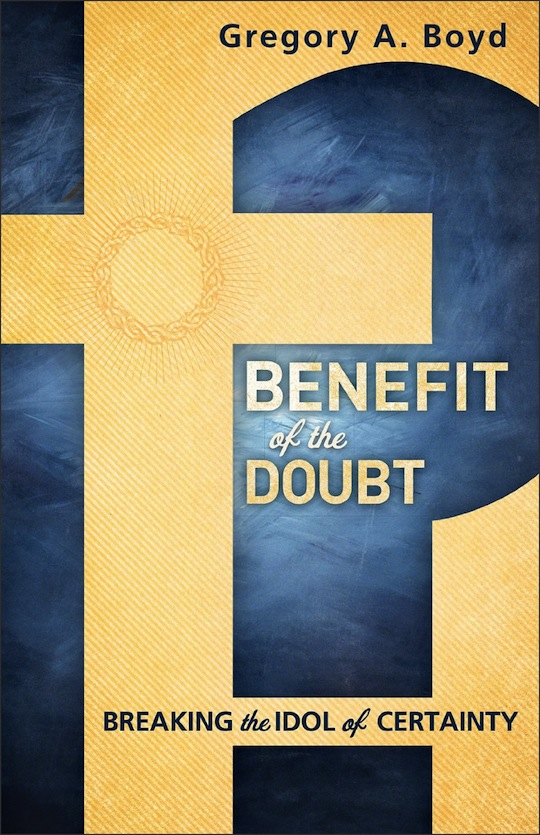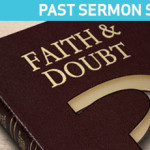We run our website the way we wished the whole internet worked: we provide high quality original content with no ads. We are funded solely by your direct support. Please consider supporting this project.
A Review of a Review of Benefit of the Doubt
 I’d like to offer a brief response to a curious on-line review of Benefit of the Doubt, published on thechristians.com. It’s titled, Which came first, Jesus or the Bible? A clever heretic draws a false division between God and Scripture. That “clever heretic” would be yours truly, and I allegedly draw this false division in my previously mentioned book.
I’d like to offer a brief response to a curious on-line review of Benefit of the Doubt, published on thechristians.com. It’s titled, Which came first, Jesus or the Bible? A clever heretic draws a false division between God and Scripture. That “clever heretic” would be yours truly, and I allegedly draw this false division in my previously mentioned book.
This review begins by saying: “Theologian, author and neo-evangelical pastor Greg Boyd is a highly intelligent man in tune with the times.” Up to this point I rather enjoyed this article. Unfortunately, the review goes downhill rather quickly from here. For the next sentences says that, judging from my “just-published book, Benefit of the Doubt: Breaking the Idol of Certainty,…[Boyd] suffers from a common contemporary affliction: an assumption that Jesus aligns very nicely with any or all of the faddish spiritualities of the 21st century.” This author unfortunately doesn’t spell out what these “faddish spiritualities” might be. Nor does he ever give an example of how my view of Jesus, as expressed in Benefit of the Doubt, “aligns very nicely” with them. In fact, since this book didn’t contain any sustained discussion of the particularities of Jesus’ earthly character or ministry, I’m wondering where on earth this person got this idea.
I began to wonder if this author had actually read this book, and my wonder only increased when he immediately went on to claim that I believe that the earliest disciples “never based their evangelism on the Bible,” but instead “proclaimed Jesus.” For instead of quoting Benefit of the Doubt to prove this point, he quotes an interview about this book that I gave to Jonathan Merrit that was published in Religion News Service (RNS). “Once [the early Christians] believed in Jesus…they looked for him and found him in their [Hebrew] scripture. But they never would have been convinced that Jesus was Lord had they started with scripture alone.” I stand by this claim, but you might have noticed that my point was not about how the early disciples evangelized, but how the early disciples did (and did not) first come to believe in Jesus.
In any event, the criticism that this author offers of this perspective is that this “is old news.” There is indeed a sense in which this is “old news,” for as I just said, this was the way the earliest disciples came to believe in Jesus. But had this reviewer read my book (which I would encourage him to do), he would have seen that I’m contrasting the way the earliest disciples grounded their faith with the way most evangelicals today ground their faith. Most today believe in Jesus because they first believe in the Bible. I instead argue it’s better to believe in the Bible as God’s Word because we already believe (on other grounds) in Jesus.
In making the Bible the foundation for why they believe in Jesus, most evangelicals force the Bible to serve as the epistemological foundation for their faith — a role I don’t believe the Bible was ever supposed to play, and a role that I don’t believe it can play very well. For when we ground our faith this way, all it takes for people’s faith to be undermined is for someone to prove that there’s one contradiction or historical inaccuracy in Scripture. And like it or not, this isn’t very hard to do, as I learned the hard way while taking my first course on “The Bible as Literature” at a secular University.
The bottom line is that I think the historical Jesus is a much stronger foundation for why we believe than the Bible (on this, see Eddy, Boyd, The Jesus Legend [Baker, 2007]). To be clear, I adamantly affirm that the Bible is the Word of God and should be the foundation for the doctrines of the Church. But I can affirm this confidently precisely because my reason for doing so isn’t anchored in the need to defend the Bible as an “inerrant,” book, but rather in the historical Jesus. Whatever one thinks of this suggestion, I doubt anyone would allege that it is “old news.”
This author then goes onto say that if my only point was “to reemphasize the centrality of Jesus in Christian belief he would be harmless, even helpful”. But the review begins to get comical when the author immediately adds, on a sinister sounding note: “However, [Boyd] is intentionally pitting Christ against scripture.” He again offers no evidence as to why he draws this dire conclusion, but perhaps we get a glimpse of his motivation when he, in the next line, states:
A vegetarian, environmentalist, and active exponent of evolution who believes in Open Theism, Boyd belongs to a sub-genre of postmodern theologians who, like Rob Bell, author of last year’s controversial book Love Wins, are so full of love they cannot even consign the devil to hell.
Oh my. Where do I begin? It’s true I am a vegetarian, I do believe that Christians have a responsibility to the environment (Gen.1:26-28), and I am an Open Theist, but what this has got to do with Benefit of the Doubt or the price of tea in China escapes me. In any case, it’s not true that I’m an “active exponent of evolution,” though I grant that I think it’s important the Church not take a dogmatic stance on Young Earth Creationism, and thus a dogmatic stance against science. And while Rob Bell is my friend and I endorsed his book as well worth reading, I have absolutely no idea why this author would claim I am a universalist who “cannot even consign the devil to hell.” The “heresy” I would have thought he would have accused me of is annihilationism, since this is the view I’ve publically defended as being the one I’m most inclined towards. Regardless, I’m still left wondering what any of this has got to do with Benefit of the Doubt, or even with my claim that Jesus rather than the Bible should be the foundation of the faith?
The author concludes his curious review by saying, “it should come as no surprise to learn that [Boyd’s] real purpose in writing Doubt is to encourage us to pass judgment on the word of God.” As the author of Doubt (odd abbreviation!), allow me to confess that I, for one, was very surprised to learn this was my motivation. And how did this author discern my real sinister intention? He explains: “Because [Boyd’s] faith is placed in Jesus, not scripture, he says, he ‘need not be threatened any longer by any historical inaccuracies or contradictions or scientific inaccuracies I may find in it.’”
This is me motivating people to “pass judgment on the word of God”? If the author had read my book, perhaps he would have gotten more insight into my motives. I think he would have seen that the whole point of my argument was to strengthen our faith in Scripture as God’s Word by providing a grounding in Christ that renders any possible “historical inaccuracies or contradictions or scientific inaccuracies” that one might find in it completely irrelevant. For now our faith in Scripture isn’t dependent on how well one can explain away each and every one of these challenges – assuming one can explain them away. Rather, our faith in Scripture is grounded in a person, for whom we have compelling reasons to accept as our Lord and Savior.
Maybe the “take away” from this review of a review is that, before you think about writing a public review of a book, it really helps to have first read it.
Lord bless you all – including this very confused reviewer!
Category: General
Tags: Benefit of the Doubt, Bible, Book Reviews, Greg Boyd, Historical Criticism, Inerrancy, Inspiration, Reviews
Related Reading

Past Sermon Series: Faith & Doubt
Faith is sometimes understood as the lack of doubt. As a result, doubt can be seen as the enemy of faith. But Biblical faith can withstand doubt and even be strengthened by it. God wants His people to wrestle with Him on the things that matter in their lives. We must not be afraid of struggling with deep…

First of Three-Part Interview With Greg
David D. Flowers is doing a three part interview with Greg over on his blog. He posted the first of those interviews today. Pop over and check it out!

A Response to “Are Greg Boyd and I Reading the Same Old Testament?”
Collin Cornell has recently published a review of Cross Vision (CV) and, less directly, of Crucifixion of the Warrior God (CWG) in The Christian Century. In this post I will respond to the two major objections Cornell raises against these books. Cornell begins by recounting a discussion I had with a woman who was deeply impacted…

Friday Lights: Connection
Each Friday we post content sent to us by our readers that is inspiring, funny, lighthearted or just generally fun. If you’d like more information on submitting content for this feature you can get more information here.

Leaders in the Revolution: An Invitation
Kevin Dooley via Compfight Network Exploration Meeting There is a growing movement of pastors, church planters, and churches around the globe who have become convinced that the center of the Gospel is a Jesus-looking God who calls his people to partner with him to advance a Jesus-looking kingdom. They sense that God is pouring out…

Podcast: Fresh Thoughts on Greg’s Blog Series on Jordan Peterson
Greg gives an update on his thoughts on Jordan Peterson after having written a series critiquing his book 12 Rules of Life. http://traffic.libsyn.com/askgregboyd/Episode_0376.mp3
